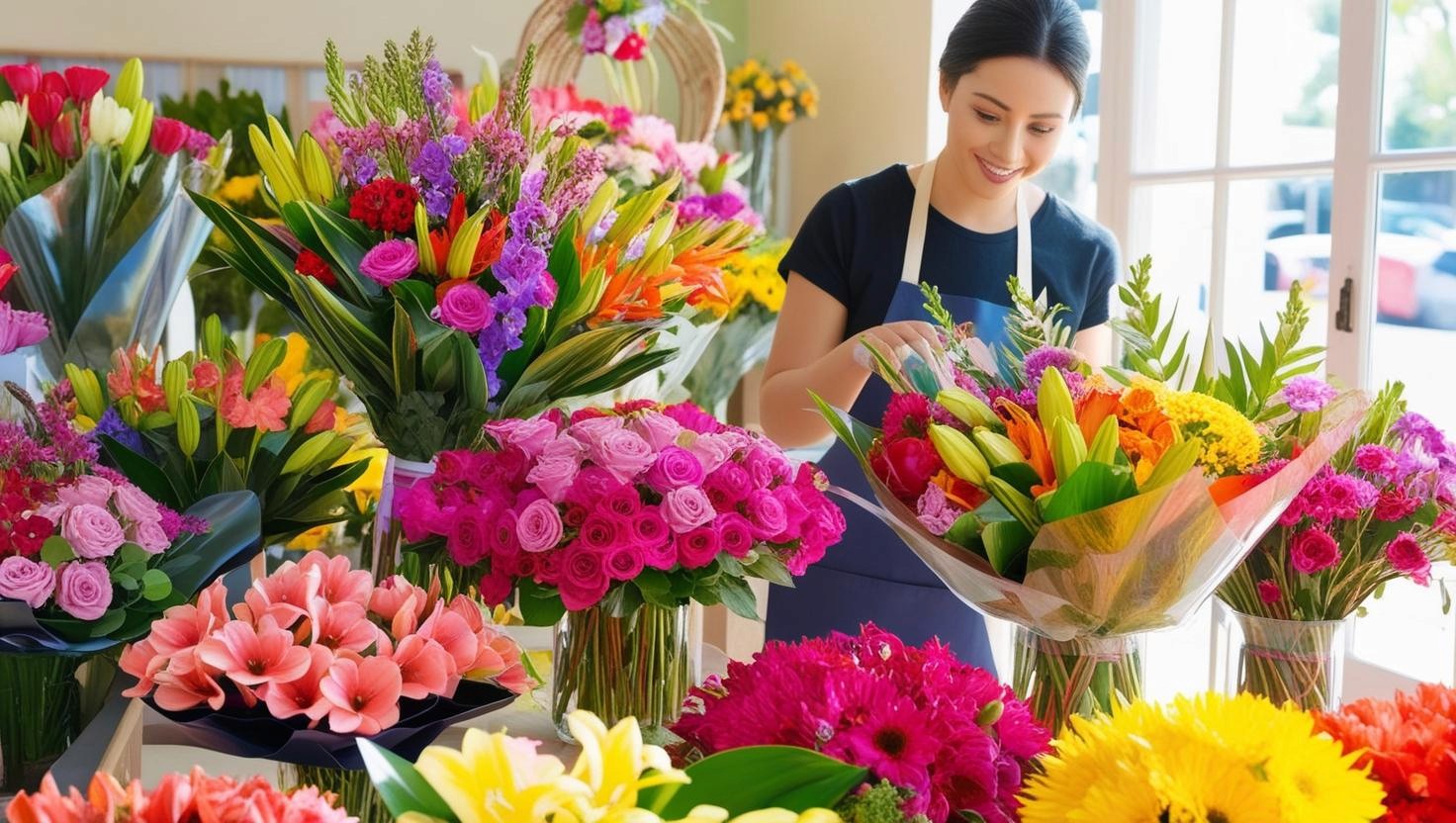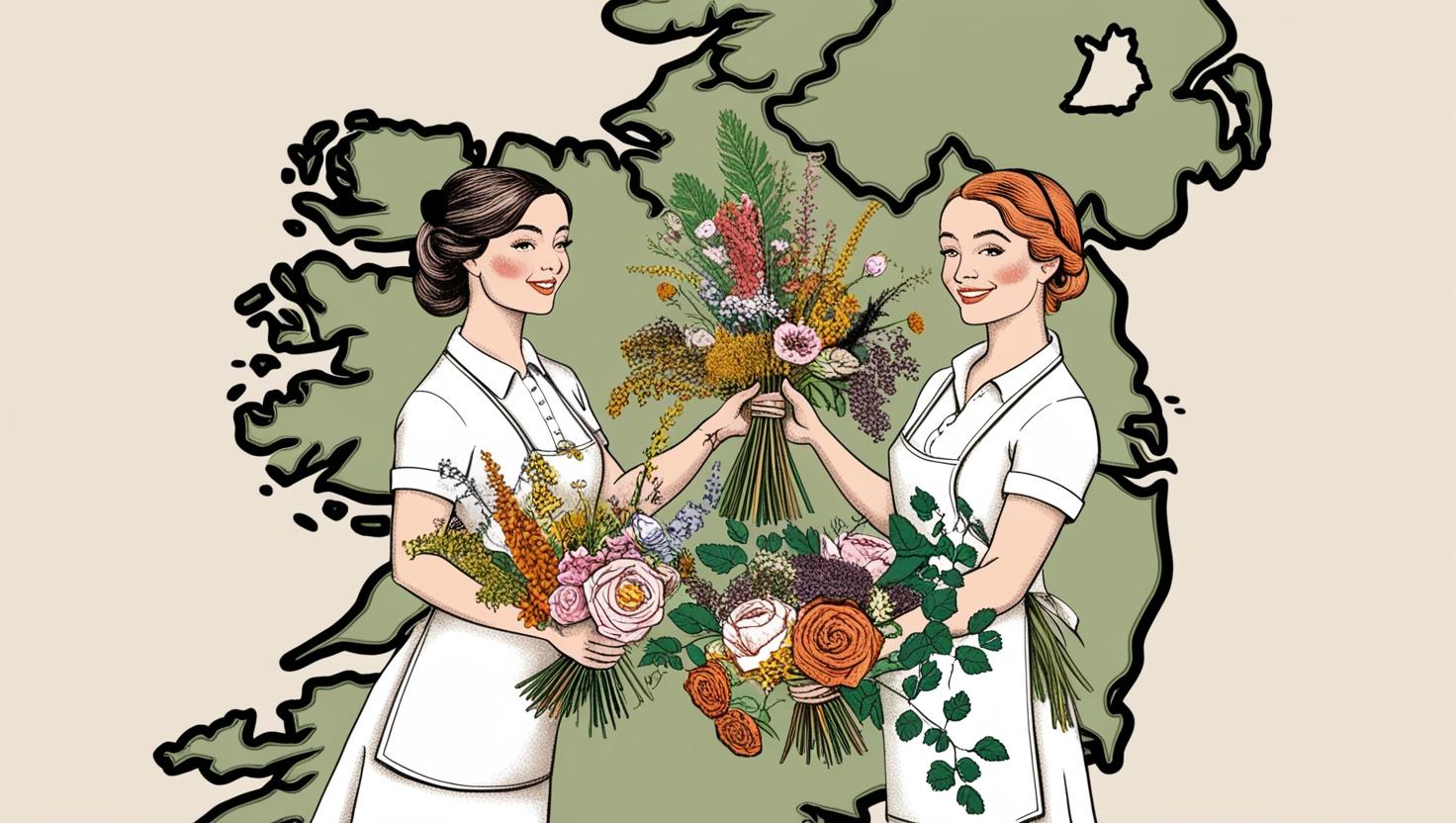Industry News
How Technology is Transforming Floristry: Key Innovations You Need to Know
How Technology is Transforming Floristry: Key Innovations You Need to Know
How Technology is Transforming Floristry: Key Innovations You Need to Know
Explore how innovations like smart delivery, TikTok Shop, and AI are revolutionizing floristry, enhancing efficiency, creativity, and customer satisfaction in a modern market.
Dec 8, 2024

The floristry industry across the UK, Ireland, and Europe is evolving rapidly, with technology driving changes that enhance efficiency, creativity, and customer engagement. From smarter delivery logistics to new sales channels, here are three transformative innovations shaping the future of floristry.
1. Transforming Flower Delivery: Interflora, FarEye, and Digital Florists Drivers App
In the floristry world, delivery logistics can make or break a customer’s experience. Freshness and punctuality are essential, but until recently, smaller florists often lacked the tools to meet rising customer expectations. That’s changing, thanks to the integration of advanced systems like Interflora’s partnership with FarEye and tools developed by Digital Florists.
Interflora, leveraging FarEye’s platform, has introduced route optimization and automated customer notifications, enabling smoother, more efficient deliveries. For Interflora members, Digital Florists makes accessing these features seamless. By automating workflows and reducing the need for manual data entry, florists can focus on their core strengths—creating beautiful arrangements—while ensuring their customers remain informed and reassured at every step.
Beyond integrations, Digital Florists offers solutions for those managing deliveries independently. The Drivers app helps florists plan efficient routes, streamline delivery workflows, and send delivery confirmations with ease. These tools make it easier for florists to provide the transparency and reliability customers now expect.
As delivery technology continues to evolve, combining Interflora’s advanced systems with complementary tools like Digital Florists ensures florists of all sizes can offer a modern, professional experience. By bridging the gap between large-scale innovations and everyday operations, florists are better equipped to meet the challenges of today’s fast-paced market.
2. Expanding Sales Channels: TikTok Shop, Deliveroo, and Uber Eats
New order sources like TikTok Shop, Deliveroo, and Uber Eats are transforming how florists connect with customers, especially younger, tech-savvy audiences. TikTok Shop merges e-commerce with entertainment, allowing florists to showcase their work through engaging videos while enabling direct purchases. Tutorials, behind-the-scenes content, and seasonal promotions create viral opportunities to attract a wider audience.
Platforms like Deliveroo and Uber Eats are also redefining convenience. Traditionally known for food delivery, these apps now allow florists to tap into the fast-paced, on-demand market. Whether it’s a last-minute gift or a same-day celebration bouquet, customers can receive fresh flowers in as little as an hour.
3. AI and Predictive Analytics: Personalizing Customer Experiences
Artificial Intelligence (AI) is still in its early stages of transforming retail floristry, but its potential is already starting to show. While many florists have yet to see AI’s direct impact on day-to-day operations like inventory or customer management, tools like ChatGPT and similar AI technologies are being widely embraced to elevate their marketing, improve website content, and streamline communication strategies.
For instance, florists are leveraging AI to craft engaging social media posts, write compelling product descriptions, and even draft personalized emails for customers. These tools save time and enhance the professionalism of marketing efforts, allowing florists to focus on creativity and customer interactions.
As AI technology becomes more tailored to the floral industry, it holds the promise of optimizing operations such as demand forecasting, dynamic pricing, and personalized product recommendations. For now, the focus remains on its indirect applications — helping florists improve their digital presence and connect more effectively with their customers. These early uses demonstrate AI’s potential to reshape floristry as its applications continue to evolve and expand.
Conclusion
From Interflora’s delivery technology to new sales channels like TikTok Shop and AI-driven personalization, technology is revolutionizing floristry. These innovations allow florists to connect with new audiences, streamline operations, and deliver exceptional service. Florists who embrace these changes today will not only meet evolving customer expectations but also lead the way in a dynamic and competitive market.
The floristry industry across the UK, Ireland, and Europe is evolving rapidly, with technology driving changes that enhance efficiency, creativity, and customer engagement. From smarter delivery logistics to new sales channels, here are three transformative innovations shaping the future of floristry.
1. Transforming Flower Delivery: Interflora, FarEye, and Digital Florists Drivers App
In the floristry world, delivery logistics can make or break a customer’s experience. Freshness and punctuality are essential, but until recently, smaller florists often lacked the tools to meet rising customer expectations. That’s changing, thanks to the integration of advanced systems like Interflora’s partnership with FarEye and tools developed by Digital Florists.
Interflora, leveraging FarEye’s platform, has introduced route optimization and automated customer notifications, enabling smoother, more efficient deliveries. For Interflora members, Digital Florists makes accessing these features seamless. By automating workflows and reducing the need for manual data entry, florists can focus on their core strengths—creating beautiful arrangements—while ensuring their customers remain informed and reassured at every step.
Beyond integrations, Digital Florists offers solutions for those managing deliveries independently. The Drivers app helps florists plan efficient routes, streamline delivery workflows, and send delivery confirmations with ease. These tools make it easier for florists to provide the transparency and reliability customers now expect.
As delivery technology continues to evolve, combining Interflora’s advanced systems with complementary tools like Digital Florists ensures florists of all sizes can offer a modern, professional experience. By bridging the gap between large-scale innovations and everyday operations, florists are better equipped to meet the challenges of today’s fast-paced market.
2. Expanding Sales Channels: TikTok Shop, Deliveroo, and Uber Eats
New order sources like TikTok Shop, Deliveroo, and Uber Eats are transforming how florists connect with customers, especially younger, tech-savvy audiences. TikTok Shop merges e-commerce with entertainment, allowing florists to showcase their work through engaging videos while enabling direct purchases. Tutorials, behind-the-scenes content, and seasonal promotions create viral opportunities to attract a wider audience.
Platforms like Deliveroo and Uber Eats are also redefining convenience. Traditionally known for food delivery, these apps now allow florists to tap into the fast-paced, on-demand market. Whether it’s a last-minute gift or a same-day celebration bouquet, customers can receive fresh flowers in as little as an hour.
3. AI and Predictive Analytics: Personalizing Customer Experiences
Artificial Intelligence (AI) is still in its early stages of transforming retail floristry, but its potential is already starting to show. While many florists have yet to see AI’s direct impact on day-to-day operations like inventory or customer management, tools like ChatGPT and similar AI technologies are being widely embraced to elevate their marketing, improve website content, and streamline communication strategies.
For instance, florists are leveraging AI to craft engaging social media posts, write compelling product descriptions, and even draft personalized emails for customers. These tools save time and enhance the professionalism of marketing efforts, allowing florists to focus on creativity and customer interactions.
As AI technology becomes more tailored to the floral industry, it holds the promise of optimizing operations such as demand forecasting, dynamic pricing, and personalized product recommendations. For now, the focus remains on its indirect applications — helping florists improve their digital presence and connect more effectively with their customers. These early uses demonstrate AI’s potential to reshape floristry as its applications continue to evolve and expand.
Conclusion
From Interflora’s delivery technology to new sales channels like TikTok Shop and AI-driven personalization, technology is revolutionizing floristry. These innovations allow florists to connect with new audiences, streamline operations, and deliver exceptional service. Florists who embrace these changes today will not only meet evolving customer expectations but also lead the way in a dynamic and competitive market.
The floristry industry across the UK, Ireland, and Europe is evolving rapidly, with technology driving changes that enhance efficiency, creativity, and customer engagement. From smarter delivery logistics to new sales channels, here are three transformative innovations shaping the future of floristry.
1. Transforming Flower Delivery: Interflora, FarEye, and Digital Florists Drivers App
In the floristry world, delivery logistics can make or break a customer’s experience. Freshness and punctuality are essential, but until recently, smaller florists often lacked the tools to meet rising customer expectations. That’s changing, thanks to the integration of advanced systems like Interflora’s partnership with FarEye and tools developed by Digital Florists.
Interflora, leveraging FarEye’s platform, has introduced route optimization and automated customer notifications, enabling smoother, more efficient deliveries. For Interflora members, Digital Florists makes accessing these features seamless. By automating workflows and reducing the need for manual data entry, florists can focus on their core strengths—creating beautiful arrangements—while ensuring their customers remain informed and reassured at every step.
Beyond integrations, Digital Florists offers solutions for those managing deliveries independently. The Drivers app helps florists plan efficient routes, streamline delivery workflows, and send delivery confirmations with ease. These tools make it easier for florists to provide the transparency and reliability customers now expect.
As delivery technology continues to evolve, combining Interflora’s advanced systems with complementary tools like Digital Florists ensures florists of all sizes can offer a modern, professional experience. By bridging the gap between large-scale innovations and everyday operations, florists are better equipped to meet the challenges of today’s fast-paced market.
2. Expanding Sales Channels: TikTok Shop, Deliveroo, and Uber Eats
New order sources like TikTok Shop, Deliveroo, and Uber Eats are transforming how florists connect with customers, especially younger, tech-savvy audiences. TikTok Shop merges e-commerce with entertainment, allowing florists to showcase their work through engaging videos while enabling direct purchases. Tutorials, behind-the-scenes content, and seasonal promotions create viral opportunities to attract a wider audience.
Platforms like Deliveroo and Uber Eats are also redefining convenience. Traditionally known for food delivery, these apps now allow florists to tap into the fast-paced, on-demand market. Whether it’s a last-minute gift or a same-day celebration bouquet, customers can receive fresh flowers in as little as an hour.
3. AI and Predictive Analytics: Personalizing Customer Experiences
Artificial Intelligence (AI) is still in its early stages of transforming retail floristry, but its potential is already starting to show. While many florists have yet to see AI’s direct impact on day-to-day operations like inventory or customer management, tools like ChatGPT and similar AI technologies are being widely embraced to elevate their marketing, improve website content, and streamline communication strategies.
For instance, florists are leveraging AI to craft engaging social media posts, write compelling product descriptions, and even draft personalized emails for customers. These tools save time and enhance the professionalism of marketing efforts, allowing florists to focus on creativity and customer interactions.
As AI technology becomes more tailored to the floral industry, it holds the promise of optimizing operations such as demand forecasting, dynamic pricing, and personalized product recommendations. For now, the focus remains on its indirect applications — helping florists improve their digital presence and connect more effectively with their customers. These early uses demonstrate AI’s potential to reshape floristry as its applications continue to evolve and expand.
Conclusion
From Interflora’s delivery technology to new sales channels like TikTok Shop and AI-driven personalization, technology is revolutionizing floristry. These innovations allow florists to connect with new audiences, streamline operations, and deliver exceptional service. Florists who embrace these changes today will not only meet evolving customer expectations but also lead the way in a dynamic and competitive market.

